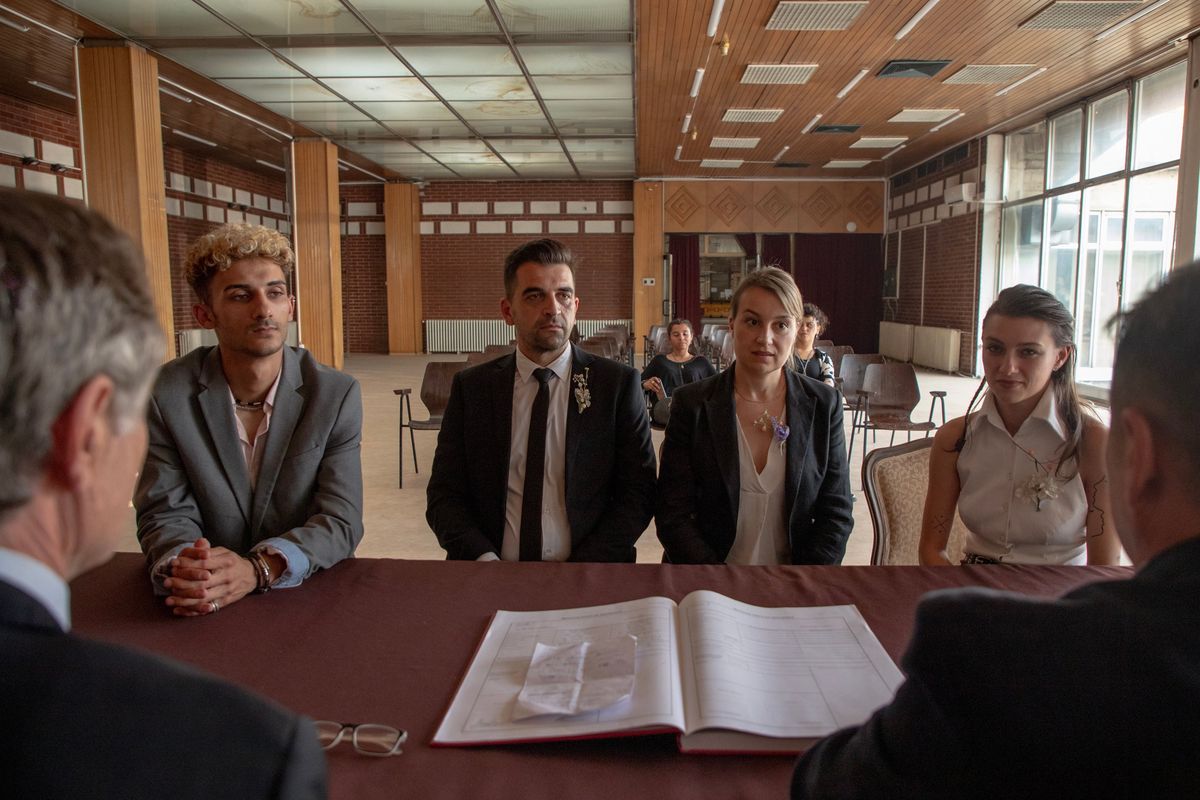Movie review: ‘Housekeeping for Beginners’ a riveting domestic tale of blended queer family

Anamaria Marinca has a knack for playing characters you’d want in your corner during a crisis. The Romanian actress, who starred in Cristian Mungiu’s harrowing abortion thriller “4 Months, 3 weeks and 2 Days,” is the eye of the storm in Goran Stolevski’s “Housekeeping for Beginners,” a riveting domestic drama that finds her similarly raging against the machine.
No one smokes a cigarette with such quietly harried intensity as Marinca, and there is no forgetting her glittering stare, both of which Stolevski uses to great effect. In his third feature in as many years –this one selected as the North Macedonian Oscar entry for best international film – the Macedonian Australian filmmaker plunges us into the swirling eddy of merry but harrowing chaos among an unusual family. The film is a showcase for the skill and screen presence of the criminally underrated Marinca, who stars as Dita, a lesbian social worker trying to hold together her tribe by sheer force of will, coaxing and cajoling the system in order to knit together her queer found family.
There’s a deeply humanist core to Stolevski’s work, which varies in genre and tone, but always captures the bittersweet beauty of life. He made his feature debut with “You Won’t Be Alone,” a life-affirming fairy tale in which Marinca co-starred as a grotesquely disfigured witch. His sophomore feature, “Of an Age” is a queer romance about two young men who connect in a Melbourne beach town.
We enter “Housekeeping for Beginners” with a burst of joyous song, as Ali (Samson Selim), Vanesa (Mia Mustafa) and Mia (Dzada Selim) dance and sing around a living room. Their carefree fun is quickly juxtaposed with a burst of rage, in a doctor’s office, as Suada (Alina Serban), with Dita by her side, explodes at a bored, negligent doctor. She’s furious at him for ignoring her and other patients who look like her – Roma. With these two scenes, Stolevski establishes the film’s message and tone, weaving together childlike play and mischief with the crushing reality of racial and sexual inequality.
Stolevski, who wrote, directed and edited the film, delivers the relevant story details in snippets of dialogue and visual asides snatched out of the river of familial hubbub that is captured with a roaming handheld cinematography by Naum Doksevski. Dita and Suada are partners, and Suada’s kids, Vanesa and Mia, live with them in Dita’s home. Their gay roommate, Toni (Vladimir Tintor) had Ali over for a hookup, but he’s so much fun he becomes one of the stray queer kids they collect, which also includes a trio of young lesbians (Sara Klimoska, Rozafa Celaj and Ajse Useini) who seek refuge in this “safe house.”
Suada has cancer, and knowing that her prognosis is terminal, she demands that Dita become the mother of her girls, in her final, fierce act to secure their future. She also requests that Dita give them Toni’s last name so that they might escape the discrimination she faced as a Roma woman. The girls need legal guardians, and that is how a stressed lesbian and grumpy gay man find themselves married. To each other.
Within its restless, naturalistic aesthetic, Stolevski crafts complex and poignant images, contrasting the play-acting the couple is forced to do with their searing gazes. At a parent-teacher conference, condolences are delivered to Toni, but the camera rests on the bereaved Dita’s face, unable to openly grieve the loss of her longtime partner. Their courthouse wedding is also a study in ironic double-meaning, as Ali sits next to his lover Toni, but only as a witness. At their raucous, booze-soaked celebration at home later, Ali thanks Dita for the opportunity to sit in front of the marriage registrar with the man he loves.
There’s no preciousness or over-explication about the sociopolitical and economic issues that shape their reality and make up the fabric of their lives: how they move in the world, the risks they take, the dreams they have. It is a quotidian kind of oppression, rendered here as a series of irritating clerical hoops, though the consequences of not jumping through them could be deadly.
While the subject matter is sobering, there is a dry humor at play, coupled with real warmth. Dzada Selim steals the movie as the precocious Mia, and if Dita is the spine of the family, Ali is the heart, his ability to connect proving valuable when Vanesa’s teenage rebellions spiral out of control.
Stolevski’s scripts always bear a line that pierces at the heart of life itself, and “Housekeeping for Beginners” is no exception. “It doesn’t go away, the needing,” Dita promises Vanesa, “even when you get old. It’s a nasty business.” It’s a beautifully, brutally apt way to describe a family, and the human condition, perfectly, concisely expressed in the way only Stolevski can.